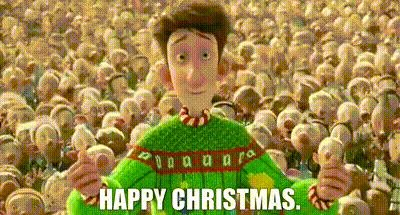
5th December 2025
11th December 2024
Over the last few years we’ve amused ourselves at Christmas by watching classic Christmas films and reviewing them with a business eye. Here’s our pick:
“Arthur Christmas”* – Aardman’s Christmas classic: at its heart, it’s a hymn to succession planning and organisational hashtag#change.
1. The profound, but sad, truth that underpins Arthur Christmas is that Steve is right. His modernisation programme has been an absolute success: he is rightly proud of his work. But he’s totally failed to win hearts and minds. His comms strategy is a disaster. He has earned respect but no-one will thank him for it. In change, communication is all.
2. In stark contrast, Arthur absolutely lives and breathes the brand – but he’s useless. There’s an inevitability about his promotion to the top job but the film ends with a sense that a terrible mistake has been made. Only in the credit sequence do we discover that Steve has been made COO – and we hope that combining a talismanic figurehead with a powerhouse organiser in the back room will prove to be a successful strategy.
3. Of all the Christmas films, this is the one where the relationship with the elves is the most troubling. Their oppression (“I lost everything in that flood”) and panic when they feel abandoned speaks volumes about their state of mind. It makes a strong case for collective bargaining, if truth be told.
On the surface, Arthur Christmas is a light hearted romp (and let’s be frank, I love it) through familiar Christmas tropes. But it has a dark heart, and leaves us concerned for the viability of the Santa brand as a going concern.
* In our house, Arthur Christmas is a cult classic. It’s an Aardman film and has a very Wallace and Gromity feel. But I suspect its reach is limited outside of people who have children of a very particular age. So if you haven’t seen it, go and watch it. It’s tremendous fu


“The Shop Around the Corner” – Although it’s over 80 years old, it feels like it could have been made for LinkedIn.
Starring Jimmy Stewart and Margaret Sullavan and made in 1940, it’s the story of the employees of a shop in the centre of Budapest.
Let’s be honest, it only gives a vague nod to Christmas. But nevertheless it’s ripe for a Christmas Film review. It is so chock full of recruitment lessons that it’s going to be hard to keep this under 10000 words.
Firstly – just hiring and firing people on a whim without the slightest grounding in reason or thought leads to disaster – who knew? With British eyes the employee relations feel incredibly dated but I suspect with an American filter this could be yesterday. People are fired because the owner suspects they are having an affair with his wife; for refusing to stay late and do extra free work; and for absolutely no reason at all but with actual physical violence.
Secondly – despite all that, there are some good decisions around internal movement. Jimmy Stewart’s character is rehired to run the shop, which turns out to be a triumph. BUT
Thirdly – the messenger boy also gets promoted (essentially extracting his promotion with menaces from an employer in hospital, but never mind that for the moment) and becomes a tyrant to his own replacement. That needs watching. Petty fiefdoms can’t be good. And the poor 17 year old is then essentially abducted by the owner at the end. It’s all quite odd.
There is so much more here. This is a cracker of a film. I’m pretty sure it was essentially remade as “You’ve Got Mail” in the 90s and you really should go and watch it.
But as a rule of thumb, don’t do anything at all that you see happen in it.
“The Christmas Chronicles” – Netflix’s gritty Santa Clause reboot.
Caught in the act of delivering presents by a young delinquent and his sister, Santa’s night goes wildly off the rails in downtown Chicago – but by increasing the team size, Santa delivers the project on time (and I suspect wildly over budget).
What can it teach us about business?
First up: if you communicate with your team on their own terms (and in their own language), you build genuine loyalty. Here is a Christmas film (finally!) where the elves don’t feel like an oppressed underclass. You feel that they’d be doing this even if Santa wasn’t involved – he’s very much a servant leader. This is a healthy, engaged team. Albeit a pretty psychotic one.
Second: Accurate, clean data is everything. Ultimately Santa Claus is able to convince people of his existence and get what he needs because he knows all about what they want for Christmas – with absolute accuracy. They feel he’s on their side because he’s done his research. Good information opens (prison) doors.
Third: Some people are simply never going to buy from you. The scene in the restaurant demonstrates that some people just don’t want what you’ve got – cut your losses (and move along. Santa steals one of their cars, but that feels over harsh. There’s every kid in the world to sell to, and limited time. Just ignore the haters.
So, much to learn: but if truth be told, the best things about this film (the sleigh, and the music scene in the prison) have nothing whatever to teach us. Except that, when in a tight spot, if you can magic up a piano, things will definitely improve.


“Elf” – a cautionary tale about a man who stayed too long in the same organisation and struggled to adapt on moving jobs.
It’s a dark tale of broken relationships and the difficulty of balancing work and family responsibilities.
What can we learn from it?
1. It’s easy enough to become institutionalised. Buddy struggles with the transition to normal life; and his Father grapples daily with the challenge of unreasonable work demands (late night pitches on Christmas Eve!). But neither seem to realise that their life is being damaged by the weight that work places on them. If there’s one thing we can take from this at Christmas, it’s that some balance in life is essential. You’re not just who you are at work.
2. Companies are too resistant to outside ideas. How the Department Store can’t see that Buddy can absolutely transform their Christmas shop with his extraordinary (and deeply weird) gifts, I will never know. Had they embraced his radical new approach they could have made an absolute killing. But instead they froze him out. Huge mistake.
3. Your company values have got to align with your product and market. Why is a children’s book company being run like a hard bitten sweat shop? Why is a department store Santa’s grotto employing people who instantly resort to violence when things get tough? This kind of misalignment was always going to get found out. You can’t create Christmas cheer by pinching the pennies and raging at your staff.
WIth the standoff between the sinister Central Park Rangers and Santa providing a confronting coda to this film’s themes of conflict and anger, we see ultimately that only enthusiasm and a passion for the central mission can really bring success.
And anyone who says otherwise sits on a throne of lies.
“Klaus”: Netflix’s fantastic Father Christmas origin story. It’s a stirring tale of market making and exploitation.
In a world devoid of gift giving and weirdly dominated by a tyrannical postal service, Jesper Johansen is sent north by his father to rot in an icebound outpost, surrounded by homicidal neighbours.
Almost by chance, he discovers that acts of kindness are the solution to all his problems, and those around him. And so he ruthlessly exploits the opportunity he’s discovered to create a huge market for the toys he makes with his mysterious business partner.
What lessons can we learn?
1. When you have a genuinely innovative idea you can make your own market. Jesper is the Jeff Bezos of the Norwegian Arctic.
2. It helps if you have a secret source of labour that you appear not to pay – Margú and her entire people get co-opted into the manufacturing effort and although they seem happy I have serious questions about their pay and benefits. There are strong overtones of the exploitation of the elves in Arthur Christmas going on here.
3. Selling into multiple markets gives you a significant commercial advantage. The genius of Jesper’s business model is that in uniting the Ellingboe and Krum clans, he actually accelerates the demand across both groups for his toys
4. But that can cause supply problems – demand gets ahead of him and he has to think quickly to avoid the whole enterprise collapsing. As per point 2, I have doubts about his solution – but moving fast and solving problems is essential.
And so we see that seeing the gap, making the market and securing the opportunity are the key to business. And, in an odd twist, that leads to less rotten fish and better education for all. It’s a crazy film, really.


5th December 2025
13th October 2025

3rd April 2025